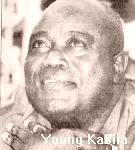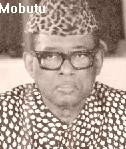





 In
the early years of Laurent Kabila’s fight he received a helping hand from a
revolutionary superstar. Ernesto (Che) Guevara, the Argentine insurgent, had
already fought alongside Fidel Castro in the Cuban revolution and, in the
process, became the Third World’s most charismatic and romantic spokesman.
Searching for new exploits, he toured Africa in early 1965, met the
Congolese-rebellion leadership in Ghana and Cairo and decided to lead a group of
100 Cuban troops in support of the revolt.
In
the early years of Laurent Kabila’s fight he received a helping hand from a
revolutionary superstar. Ernesto (Che) Guevara, the Argentine insurgent, had
already fought alongside Fidel Castro in the Cuban revolution and, in the
process, became the Third World’s most charismatic and romantic spokesman.
Searching for new exploits, he toured Africa in early 1965, met the
Congolese-rebellion leadership in Ghana and Cairo and decided to lead a group of
100 Cuban troops in support of the revolt.
During his six months in Africa Che kept a diary recording his bouts of dysentery and asthma, along with his assessment of Kabila. In the 150-page unpublished manuscript, entitled “Passages From the Revolutionary War (The Congo),” Che time and again vents his frustration with Kabila. The leader was habitually unwilling to show his face at the front, Che writes, spending his time, along with other Congolese leaders, instead in Cairo, Dar es Salaam and Paris “in the best hotels, issuing communiques and drinking Scotch in the company of beautiful women,” or in Kigoma, moving from “saloon to whorehouse.” Kabila also refused to allow Che to participate directly in the fighting—for a simple reason, according to Che: the troops: would never have understood why an Argentine doctor from Cuba was leading them into combat while their local leader spent his time wining and dining across Africa. Excerpts:
“Every day it was the same old story; Kabila did not arrive today, but he will be here tomorrow, and if not, then the day after tomorrow. . . Kabila has not set foot since time immemorial at the front. . . Nothing leads me to believe that Kabila is the man of the hour. He allows the days to go by without worrying about anything other than political infighting and is too, addicted to drink and women . . . If someone were to ask me whether there is an individual in the Congo who could become a national figure, I could not answer affirmatively. The only man who has the potential to be a mass leader is Kabila. A totally pure revolutionary, if he does not have leadership skills, cannot lead a revolution, but a man with leadership skills does not become, ipso facto, a revolutionary leader. One has to be serious, and possess an ideology and a spirit of sacrifice to accompany one’s goals. Until now, Kabila has not shown any of these traits. He is young and might change, but for now, I am willing to express serious doubts, which will only be published many years hence, that he will be able to overcome his defects.”
 Mobutu
took power toward the end of 1965, and Che soon headed home. He would die less
than two years later. As the journal shows, his African adventure was largely a
disappointment. But he wasn’t entirely wrong in choosing the Congo as an
African beachhead, nor Laurent Kabila as his associate—just more than 30
years ahead of his time.
Mobutu
took power toward the end of 1965, and Che soon headed home. He would die less
than two years later. As the journal shows, his African adventure was largely a
disappointment. But he wasn’t entirely wrong in choosing the Congo as an
African beachhead, nor Laurent Kabila as his associate—just more than 30
years ahead of his time.
“Companero: The Life and Death of Che Guevera,” Jorge G. Castaneda’s biography of Che Guevara, will be published in September by Alfred A. Knopf.
-Newsweek
So, how’s young Tony Blair, the youngest British Prime Minister of the 20th century, and his “New Labour” lads doing? Quite well is the answer we get from most Fleet Street pundits though some of the veterans hedge their bets. Too early, much too early, they warn you.
Since Her Majesty Queen Elizabeth did deliver what is still called “the Throne Speech” in many Commonwealth countries, we have a clearer idea of Prime Minister Blair’s priorities, and therefore the likely parliamentary agenda of this Labour administration. In any case after 18 years of Conservative party rule, many a Labour initiative is likely to look quite radical.
At least we do know that 26 Bills will be presented in the next 18 months, and five items of the party manifesto will receive immediate attention. (1) Hospital waiting lists will be shortened (2) The size of primary school classes will be cut (3) Swifter justice for persistent juvenile offenders (4) 250,000 young people will be moved from “welfare to work” and (5) Creating the right conditions for “lasting prosperity”.
Will the Old Guard, sometimes called a Laskian caucus, defend “democratic socialism”. It is certain to be tempted to form a tactical alliance with the T.U.C., the huge Labour-controlled trade union federation. The T.U.C. has muscle. But Mr. Blair’s rise has been so spectacular that he is a free agent. Certainly for now, he will call the shots, in the main decision-making bodies. The trouble will probably start when he introduces economic policies that look far more like Tory than social welfarist Labour. That’s when the union leader and the traditional pro-Labour family begin to ask “what’s the difference?”. Then “New Labour” will be confronted by the disenchanted.
A period of 18 years is a long wait.
The overwhelming parliamentary majority has left Blair exposed to demands from the unions, the party branches, the veteran loyalists, and of course the M.Ps. Recognising this danger, Anthony King, Professor of Government at Essex University, hoped for a different scenario. “Ever since becoming party leader in 1994, Mr. Blair has been wooing Paddy Ashdown’s Liberal Democrats. Nothing explicit. No hugs or kisses. But a steady aligning of policies together with a blanket refusal to engage in the kind of inter-party abuse that passes for political debate in Britain. Mr. Ashdown happily reciprocates.”
But now the party leader - Prime Minister has a huge majority in the House. So no excuses. The party leader must be grateful to a party that made this scintillating victory possible. How will he deal with these constituency pressures, a nation-wide constituency that has been ignored or neglected for 18 years? Mr. Tony Blair has a huge job before him, the burden of a spectacular victory.
Nobody has to whisper in the Prime Minister’s ear........”the economy, stupid....” And how is the British economy? Let’s listen to the oracle, the I.M.F.
Britain will have the strongest economy in Europe, and the second strongest, after Canada, in the G7. It will also have the highest interest rates among the G7 countries, with the possible exception of Italy. Despite these relatively high interest rates, growth will appear secure, driven by rapidly rising real incomes, sums up the TIMES economics editor, Anatole Kaletsky.
The governor of the Bank of England, Eddie George, told a recent meeting of Central Bankers in Basle, Switzerland that his country has a “better or even chance” of meeting the government’s target.
The Bank is one of the important institutions that the Blair administration plans to reform. In March inflation was 2.7.%. After the polls, Mr. George who has been asked to chair the monetary policy committee set up by the government told the press: “Our job is to achieve the target for inflation that the government has set of 2.5%. The quarterly, INFLATION REPORT, confirmed the trend, cheerful news for any new regime, anywhere.
Is Northern Ireland, often called “the longest war” (of its kind) a domestic or external policy question? It certainly concerns Ireland. And that explains the ‘diplomatic’ missions which Mr. Gerry Adams, the Sinn Fein President undertakes the United States included. And Dublin of course.
The recent Dublin talks marked an interesting change. Less than three weeks after he moved to No. 10, Prime Minister Blair relaxed the ban on official contact with the I.R.A. The ban of course was conditional. Talks could be held after an I.R.A. ceasefire.
It was Robin Cook, the new Foreign Secretary, who discussed the new Labour Goverment’s foreign policy in detail when he addressed the media at his “first formal press conference”. Reports of the conference indicated that Europe and the U.S. and Britain’s relations with both, will dominate Foreign Office thinking. What if London has to choose? That has always been a problem for an island cut off from the continent by a channel, the English channel, and the magnetic pull of the mighty United States, the home of the American cousins, destined to become a post-war superpower, and the sole post-Cold War superpower.
Not surprisingly, Foreign Secretary Cook called this line of thinking ‘a false dichotomy’. The truth of the matter, he said,” is that Washington does not want a Britain that is marginalised offshore from Europe”. If that’s what the cousin really think then the Labour party and Foreign Secretary Cook have no difficult choices to make. Far more clear and straightforward is Labour’s commitment to human rights, arms control, environment and the war on drugs. The Labour party will put human rights at the heart of our foreign policy.” Foreign policy must have an ethical dimension, he said.
But what of the European Union’s Protocol on Social Policy which Prime Minister John Major and his ministers saw as a dangerous step ........the first step in fact of an invasion of Brussels bureaucrats!. Once more it concerned jobs... about 500,000 if one accepts the Tory arguments. Multi-national firms that operate in two or three European countries must hold a consultative meeting with employees at least once a year, and allow up to three months of unpaid leave. It does look quite innocent and eminently fair-minded. Yet, the L.S.E.’s Prof. Kenneth Minogue believes it will impose heavy burdens. He speaks of “dangers” ahead. For Prime Minister Blair and the Labour party however the central issue is where Britain’s fundamental interests will lie in the 21st century across the channel or across the Atlantic ..........a fascinating problem since it involves geography, history, material interests, language and culture.
Schools and health service reform, new legislatures for Scotland and Wales, gun laws, Freedom of Information laws, restructuring National Health Service, removing privileges of hereditary peers, party campaign funds..... some of the subjects on which the Blair Government will draft legislation in the next 18 months.
Return to the News/Comment contents page






Please send your comments and suggestions on this web site to
info@suntimes.is.lk or to
webmaster@infolabs.is.lk